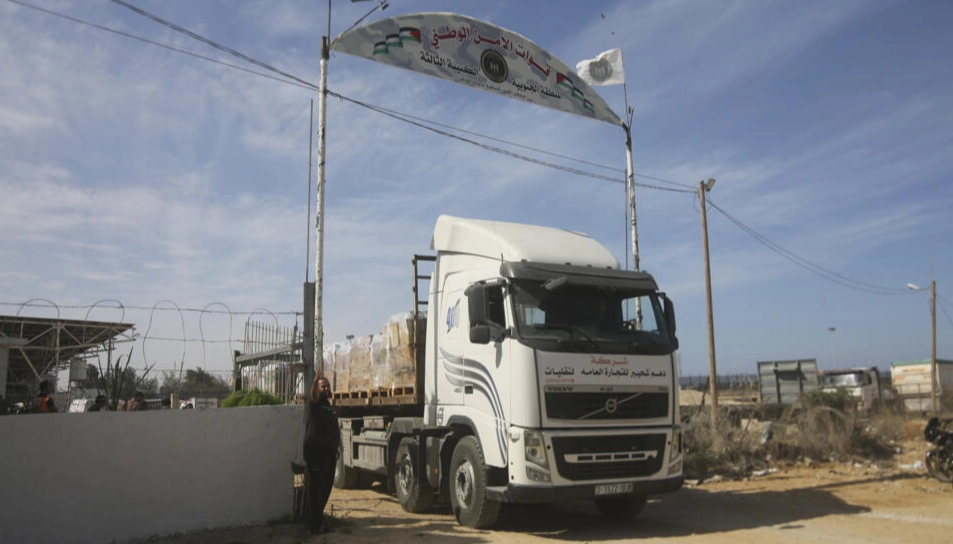
Gaza City, October 21 (RHC)-- The Rafah border crossing between Egypt and Gaza has opened to let a small amount of desperately needed aid flow to Palestinians running short of food, medicine and water in the territory that is under an Israeli siege.
A convoy including 20 aid trucks entered the Gaza Strip on Saturday from Egypt, carrying medicine and food supplies, a statement from Palestinian group Hamas said.
More than 200 trucks carrying roughly 3,000 tonnes of aid had been positioned near the crossing for days ready to head into Gaza. “The relief aid convoy that is supposed to enter today includes 20 trucks that carry medicine, medical supplies, and a limited amount of food supplies [canned goods],” Hamas’s media office said earlier.
Martin Griffiths, the UN’s emergency relief coordinator, welcomed the delivery, saying it followed “days of deep and intense negotiations with all relevant sides to make sure that aid operation into Gaza resumes as quickly as possible and with the right conditions”.
“I am confident that this delivery will be the start of a sustainable effort to provide essential supplies – including food, water, medicine and fuel – to the people of Gaza, in a safe, dependable, unconditional and unimpeded manner,” he added.
Israel has repeated that the aid shipments entering Gaza on Saturday from Egypt would not include fuel.
This is a major concern for the besieged enclave’s population and the relief agencies providing essential services, as fuel is required to pump the water supply and power generators used for operating crucial facilities such as hospitals.
Residents traditionally need to fill up tanks to access water. Without fuel, they cannot operate trucks needed to transport water or pump it.
Last Sunday, Gaza’s last functioning seawater desalination plant shut down due to fuel running out.
Several hospitals are currently completely out of service while others are running on very low fuel supplies and have already had to shut down major health departments.
Without fuel, thousands of patients including newborn babies in incubators are at immediate risk. Doctors say many patients, such as kidney and cancer patients, are already straddling a line between life and death.
“Fuel is absolutely critical,” Juliette Touma, communications director at UNRWA, told Al Jazeera. “Fuel needs to come in. If we are expected, and we would like to, continue to deliver assistance to people, we will need fuel.”
For two weeks, Israel has blockaded the territory and launched waves of punishing air attacks following an October 7 rampage by Hamas fighters on towns in southern Israel.
Al Jazeera’s James Bays said that although the opening of the Rafah crossing is “significant” as it might lead to more aid being sent into Gaza, experts are saying more is aid needed.
“I have to say 20 trucks, given that Gaza used to get – in terms of aid coming into Gaza before this conflict started – about 100 trucks of aid a day … so this really is a drop in the ocean,” he said.
Many in Gaza, reduced to eating one meal a day and without enough water to drink, are waiting desperately for aid. Hospital workers were also in urgent need of medical supplies and fuel for their generators as they treat thousands of people wounded in the bombings.
Cindy McCain, the executive director of the World Food Programme, told Al Jazeera that 20 trucks of aid is not enough.
“The situation inside Gaza is dire. Not only is there no food, there is no water, electricity, or fuel. And that combination is not only catastrophic but can lead to more starvation and disease as well,” she said. “We’ve got to get more trucks in.”
Israel has sealed off the territory, forcing Palestinians to ration food and drink filthy water from wells. Hospitals say they are running low on medicine and fuel for emergency generators amid a territory-wide blackout.
Hamas’s media office issued a statement on Saturday saying that expected truckloads of aid “will not change the catastrophic medical conditions in Gaza.”

